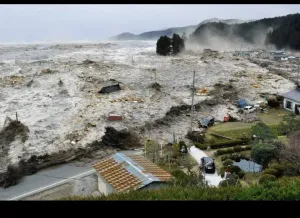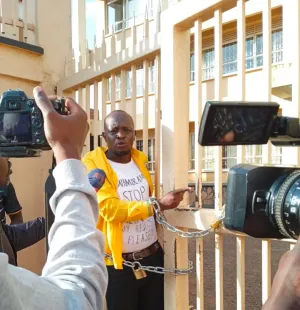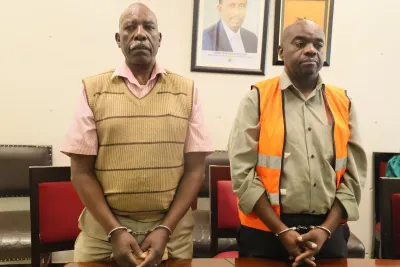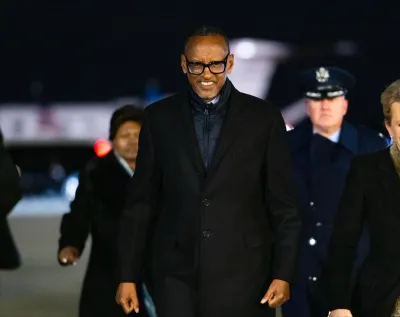

Bishop David Kiganda has been one of those that have protested the re-opening of churches
In a press interview last week, the leader of the Inter-faith Council of Kenya, Sheikh Hassan Ole Nadur, argued that it was a pertinent challenge for the religious leaders to think of opening the houses of worship for the faithful to go back to pray as used to be the case before Covid-19. He asked: “What criterion will you use to choose the people to worship and reject others”?

This question is pertinent in view of what some parishioners in a Catholic Church in Abaita Babiri, near Entebbe, were able to achieve. Accordingly, the priest there got 15 parishioners into the church, taking into account the requirements, the World health Organization (WHO) has instituted for group gatherings.
In a chapel that would normally take in about 50 worshippers; for the case of social distancing, the 15 sat scattered on alternating pews, two meters apart from each other.
When receiving the Sacrament of the Eucharist, the priest‘s hands were encased in white plastic gloves and he delivered the bread with an out-stretched hand to each worshiper also, stretching their hands to receive it.
This action obeyed the two-meter distancing between people in crowded places.
Even then, you can feel the cumbersomeness of the whole process. The worship is now concentrated on avoiding catching the virus, instead of the actual point of praising God!
In essence it begs the question of going for church service at all.
This is the issue Nadur is raising. Most of the Christian churches and mosques here admit more than 300 people on the low minimum average.
For the Christians, there are pews; and church organization can space them, if the pews are not fixed on the church floor, as is usual. They can also direct the parishioners to space themselves. So, for a church of 300 the priest may admit 50 worshipers.
Normally, on a Sunday, the Christian day for worship, parishioners throng the churches and other places of Pentecostal prayers; to the tune of thousands.
A similar occurrence takes place on Friday prayers for the Muslim faithful.
In the mosques, the Imams would be hard-pressed to apportion the people to the space they would have to stand/bow in. In this scenario, how are the prelates supposed to select the people coming to pray?
It is a mind-boggling prospect on both sides. On the side of the parishioners, presumably, they would have to go to the place of worship, well in advance to the time for which the prayers are to start, so that they would be vetted to attend.
Even in this process, they would be required to observe the regular Covid practice by the entry: wash or sanitize hands, social distancing; have face masks on, etc.
Taking in the normal day work practice, these things are not religiously adhered to. People rush to taxis, for instance without observing social distancing.
Hand washing or even sanitizing is no longer observed. Face masks have become chin masks: people do not cover their noses with them much any longer.
On the part of the prelates, if they are not to get the parishioners to churches/mosques on the day of prayer, presumably, they would have to accept people before hand, maybe by invitation, with either written or WhatsApp/Facebook application.
In the normal times, where the number of attendances was three in a day, maybe they now would have to make double or even more than that in each day service.
Logistically, a mere consideration of this is disturbing.
In that case, assuming the prayers are allowed to go ahead, the management of arranging them would not be ideal.
In the case where there would be even one asymptomatic person– and not showing any outside indication of being infected by the virus – you can see that a great number of people would get infected by the Coronavirus.
The people who are apparently pushing for the church/mosque regular services to resume do not appear to have considered the improbable logistics of having these prayers.
Those who argue that, because of their faith in Him, they are protected from the virus, maybe duping themselves. Such people are like the Jewish Pharisees, who went to show-off at the places of worship, so that the other people judge them as God-fearing.
Asked about this, one of the noted international Pentecostal pastors, T.D. Jakes referred them to the Book of James, 2:16-19.
As stated by the Contemporary English Version Bible, the Word of God notes that:“If you know someone who doesn’t have any clothes or food, you shouldn’t just say, ‘I hope all goes well for you…. What good is it to say this, unless you do something to help?
Faith that doesn’t lead us to do good deeds is all alone and dead…. ‘Prove that you have faith without doing kind deeds, and I will prove that I have faith by doing them.’ You surely believe there is only one God. That’s fine. Even demons believe this, and it makes them shake with fear.”
Or, in this COVID era: insisting on opening prayer houses without ascertaining that people will not be infected is demonic – and certainly does not help others.














Ikebesi Omoding
Ikebesi Omoding is the acclaimed author of a weekly column titled: From the Outside Looking In
Leave a Comment
Your email address will not be published.